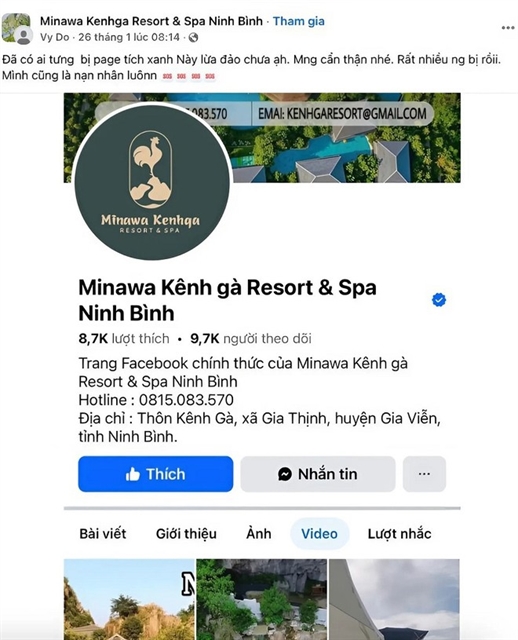 Society
Society

 |
| Fake fanpage impersonating Minawa Kênh Gà Resort in Ninh Bình Province scams tourists through online booking deposits. Photo anninhthudo.vn |
HÀ NỘI — The Việt Nam National Authority of Tourism has instructed local tourism service businesses to take measures to protect customers from fraud and asset appropriation, particularly as online booking scams continue to rise.
Tourism service businesses are required to regularly review and promptly detect fraudulent information platforms and fake social media pages impersonating their businesses. They must report these to authorities to ensure timely prevention and intervention.
This move follows recent incidents where scammers created fake websites and fan pages impersonating reputable tourism businesses. They lured victims with false discounts and promotions, requiring advance deposits before embezzling funds from unsuspecting customers. Such fraudulent activities have damaged the reputation of the tourism industry and caused public concern.
Additionally, the directive aims to prevent, detect and combat online financial fraud using high-tech methods. The goal is to protect tourists' rights, safeguard the industry’s credibility and raise awareness among tourism businesses, citizens and travellers.
The Việt Nam National Authority of Tourism (VNAT) has urged local tourism management departments to increase public awareness by educating tourism businesses and the public about new scam tactics in the industry.
The authority advised travellers to carefully verify the legitimacy of tourism service providers, especially accommodation services, before making bookings or payments. Tourists should only book services through official websites and fan pages of tourism businesses who have licences, as verified by local tourism authorities or reputable booking platforms.
Furthermore, local tourism departments are required to strengthen inspections and law enforcement efforts to swiftly detect and penalise violations. Authorities must also handle complaints from citizens, cooperate with law enforcement to identify and shut down fraudulent websites and pages, and take strict action against those involved in scams.
To enhance transparency, local tourism departments should publicly share information about registered tourism businesses to help tourists make informed bookings. They should also update and integrate verified tourism business data into the VNAT's official database, ensuring nationwide access to authentic service providers.
For local tourism service businesses, the VNAT has instructed them to proactively identify and address fraudulent platforms and fake social media pages impersonating their businesses. They must coordinate with relevant authorities to resolve and handle such cases promptly.
Additionally, businesses are urged to implement stronger security measures to prevent unauthorised access and fraudsters trying to impersonate them. They should also provide local tourism management departments with official information about their websites, fan pages, and social media platforms to help distinguish legitimate pages from fake ones.
During the 2025 Lunar New Year holiday, a tourist booked accommodation for two adults and two children from January 31 to February 3, 2025, through a Facebook fan page claiming to represent Minawa Kênh Gà Resort in Ninh Bình.
After contacting the page and receiving consultation, the tourist transferred a deposit of VNĐ6.5 million (US$236). However, after making the payment, the scammer falsely claimed that the transaction details were incorrect and requested the tourist to resend the money for verification by the accounting department, promising a refund for any excess amount.
Through multiple transactions, the total amount transferred to the scammer exceeded VNĐ1 billion. The tourist only realised it was a scam when she could no longer contact the resort and subsequently reported the case to the police.
Moreover, many consumers have fallen victim to online booking fraud due to the increasing number of scammers creating fake hotel and resort fan pages. These fraudsters use deceptive techniques to obtain Facebook’s verification badge, a blue blue checkmark, making their pages appear legitimate and trustworthy.
The authority advised the public to remain vigilant and exercise caution when booking accommodation online, ensuring they verify the authenticity of hotel and resort pages before putting across any payments. —VNS




